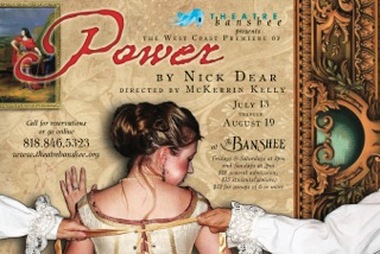Power

by Nick Dear
directed by McKerrin Kelly
Awards: part of LA Critic’s Circle Award for Best Season
Scenic Design – Arthur MacBride
Costume Design – Laura Brody
Lighting Design – Michael Mahlum
Sound Design – Mark McClain Wilson
FEATURING: Andra Carlson, Steve Coombs, Matt Foyer, Casey Kramer, David Paveo,
Lesley Smith, and Jason Tendell
Produced by Theatre Banshee Theatre in Los Angeles, CA
"Director McKerrin Kelly keeps the action briskly paced and perfectly in period" Los Angeles Times
"Directed by McKerrin Kelly with sardonic passion and flair" CurtainUp.com
Director's Note
Power. Noun: “The possession of control or command over others; authority, ascendancy.”
The definition seems straightforward enough, and yet somehow this word still elicits so many questions. Who actually possesses it? How does one attain it? Why is it so seductive? What would you do with it?
History is full of countless tales of the pursuit, use, abuse, usurping and shifting of power.
Nick Dear’s Power is a re-imagining of one of those tales. The story focuses on Louis XIV, one of most important and widely known monarchs in history, and, although it deals with grand political and historical figures, there is little, if any reference to major military or political schemes. There are no wars, fight scenes or uprisings. Instead, we watch as a young, idealistic Louis and his older, cynical but charming advisor Fouquet navigate issues of family, progress, sex, money and age by observing and manipulating emotions and personal relationships. Without lifting a sword or firing a shot Louis succeeds in making major shifts in the political landscape as well as setting himself up for one of the longest reigns of any monarch.
Power provides us with a historical mirror in which we can see that extremely powerful people are still simply human beings with human emotions. We see that regardless of lofty ideals, critically important decisions with dire global implications are often motivated and manipulated by the pettiest of personal feelings. But, most importantly -and perhaps the most difficult to acknowledge - is the reminder that great individual power is impossible without the consent, willing or unwilling, of others.
directed by McKerrin Kelly
Awards: part of LA Critic’s Circle Award for Best Season
Scenic Design – Arthur MacBride
Costume Design – Laura Brody
Lighting Design – Michael Mahlum
Sound Design – Mark McClain Wilson
FEATURING: Andra Carlson, Steve Coombs, Matt Foyer, Casey Kramer, David Paveo,
Lesley Smith, and Jason Tendell
Produced by Theatre Banshee Theatre in Los Angeles, CA
"Director McKerrin Kelly keeps the action briskly paced and perfectly in period" Los Angeles Times
"Directed by McKerrin Kelly with sardonic passion and flair" CurtainUp.com
Director's Note
Power. Noun: “The possession of control or command over others; authority, ascendancy.”
The definition seems straightforward enough, and yet somehow this word still elicits so many questions. Who actually possesses it? How does one attain it? Why is it so seductive? What would you do with it?
History is full of countless tales of the pursuit, use, abuse, usurping and shifting of power.
Nick Dear’s Power is a re-imagining of one of those tales. The story focuses on Louis XIV, one of most important and widely known monarchs in history, and, although it deals with grand political and historical figures, there is little, if any reference to major military or political schemes. There are no wars, fight scenes or uprisings. Instead, we watch as a young, idealistic Louis and his older, cynical but charming advisor Fouquet navigate issues of family, progress, sex, money and age by observing and manipulating emotions and personal relationships. Without lifting a sword or firing a shot Louis succeeds in making major shifts in the political landscape as well as setting himself up for one of the longest reigns of any monarch.
Power provides us with a historical mirror in which we can see that extremely powerful people are still simply human beings with human emotions. We see that regardless of lofty ideals, critically important decisions with dire global implications are often motivated and manipulated by the pettiest of personal feelings. But, most importantly -and perhaps the most difficult to acknowledge - is the reminder that great individual power is impossible without the consent, willing or unwilling, of others.
